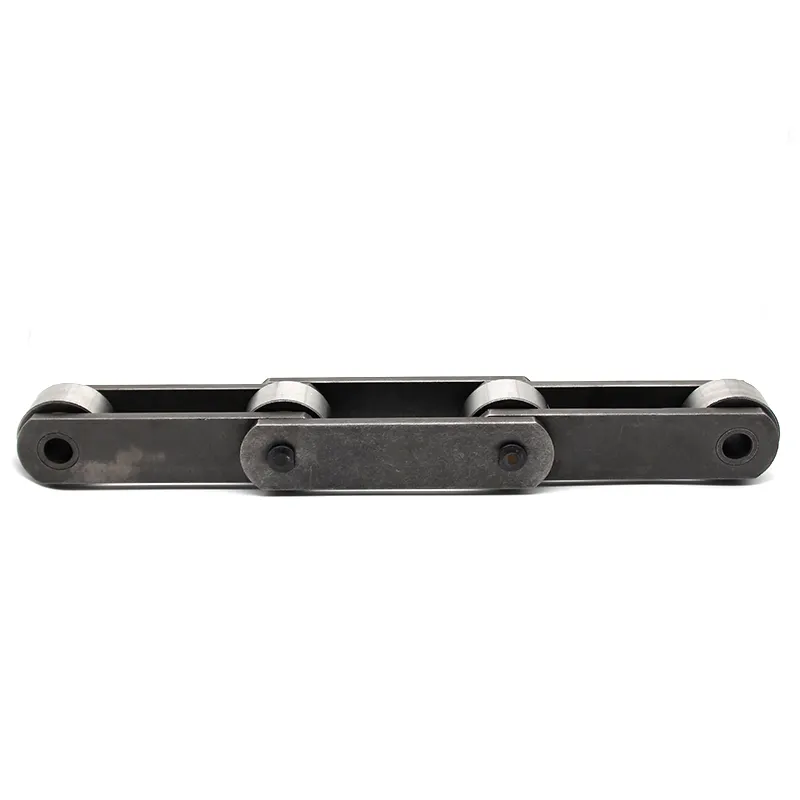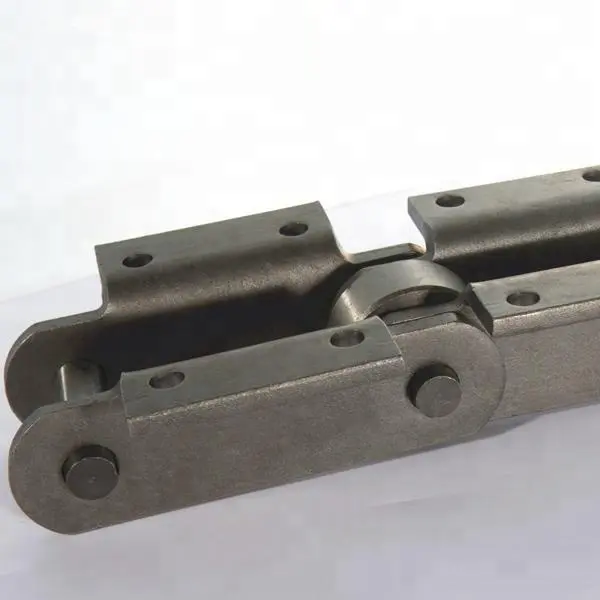Product Description
Product Description
Hollow pin chain, cast fixed pin chain, pintle chain, drop forged link chain and Engineer Class Driving Chain, with alloy steel and stainless steel selection according to your requirement
1, Chain types: drop forged rivetless chain, Roller Chain, conveyor chain, agricultural chain, sugar industry chain, palm oil industry chain, asphalt industry chain,elevator conveyor industry chain, double flex chain, pintle chain, weld steel drag chains, malleable chain etc;
2, Main materials: It is 40Mn. 40Cr, 45Mn alloy steel or SUS304 for plates, 10#, 20#, 20CrMnMo, 30CrMnTi for pins and rollers;
3, Heat treatment: Carburizing, Austemper Stressing, nitro-caburizing harden etc;
4, Surface: Shot peening, black, blue or original;
5, Package way: Plastic bag+ carton box+ plywood case
Detailed Photos
Product Parameters
Packaging & Shipping
1. Inner packing: Poly bag, air bubble bag, carton according to buyer’s request.
2. Outer packing: OSB case or pallet.
3. Please remember to leave the correct contact ADDRESS information for delivery.
Our Advantages
Company Profile
We are a leading manufacturer of mechanical transmission spare parts, as well as several years 1 of reliable and trustworthy vendors. Our main items are roller chain, conveyor chain, agricultural chain, sugar industry chain, palm oil industry chain, asphalt industry chain,elevator conveyor industry chain etc.
At present, For South American, European, and Asian market, our superior products are fabricated according to your requirement and our quality meets ISO, ASME, DIN standard.
Please watch our process steps as below
(1) punch its outer plate and inner plates
(2)Shot peening workshop
(3) heat treatment workshop
(4) assembly preparation
(5) pins process
(6) Tensile Properties Test before shipment
After Sales Service
Our products can be repaired or replaced the new parts with free cost in six months.
FAQ
Question:
1.Q:How about mould cost?
A: primarily depend on : 1.Drawing, 2.material, 3.weight and quantity.
We need to know the structure of each parts to analyze the mold solution by:
1) –Complete design drawing, product model or actual sample —– the best way
–PDF drawing with complete dimension for each parts
–Clearly photos for each parts with more angle-views to show every features.
2)The materials, technical parameters and surface treatments.
technical parameters: tell us about its model, pitch, roller diameter, width between inner plates, attachment type, outside drawing etc.
3)The quantity of order.
2.Q:How to control the product processing?
A: The processing report or pictures will be sent to the customer every week/ each month for review.
3.Q:Who will own the mould?
A:Customer, also the mould can be kept in our factory for future order.
4.Q:How long do you make your quotation?
A:After receiving detail informations we will quote in 1 to 3 days.
5.Q: MOQ? —
small chain type: if its pitch is less than 38.10mm and its thickness is less than 5mm, MOQ is 1500 CHINAMFG on these roller chains or conveyor chains;
middle chain type: if its pitch belongs (38.10mm
big chain type: if its pitch is more than 76.20mm and its thickness is more than 10mm, MOQ is 200 CHINAMFG on these roller chains or conveyor chains;
I hope we can do business together, and look CHINAMFG to hearing from you soon
/* January 22, 2571 19:08:37 */!function(){function s(e,r){var a,o={};try{e&&e.split(“,”).forEach(function(e,t){e&&(a=e.match(/(.*?):(.*)$/))&&1
| Material: | Alloy/Carbon Steel |
|---|---|
| Structure: | Welded Chain |
| Surface Treatment: | Shot Peening |
| Chain Size: | 8.00mm |
| Feature: | Heat Resistant |
| Model: | Wrc132 |
| Samples: |
US$ 39.50/Meter
1 Meter(Min.Order) | |
|---|
| Customization: |
Available
| Customized Request |
|---|

What are the environmental considerations when using mill chains?
When using mill chains in industrial applications, several environmental considerations should be taken into account. These factors are important for sustainable and eco-friendly operations. Here are the key environmental considerations:
1. Lubrication: Proper lubrication of mill chains is essential for reducing friction and wear, which can lead to chain failure and increased energy consumption. Using environmentally friendly lubricants can minimize the impact on the environment.
2. Noise and Vibration: Excessive noise and vibration from chains can negatively impact the surrounding environment and workers’ well-being. Choosing chains with low noise and vibration characteristics can help maintain a more pleasant and safe working environment.
3. Material Selection: Opting for chains made from materials with low environmental impact, such as recycled or sustainable materials, can contribute to eco-friendliness.
4. Chain Recycling and Disposal: Implementing proper chain recycling and disposal practices ensures that end-of-life chains are managed in an environmentally responsible manner.
5. Chain Maintenance: Regular maintenance of mill chains is crucial to prevent premature wear and reduce the likelihood of environmental contamination from chain breakages.
6. Energy Efficiency: Selecting energy-efficient chain designs and maintaining proper tension can lead to reduced energy consumption and lower greenhouse gas emissions.
7. Preventing Chain Contamination: Keeping chains clean and free from debris can prevent potential environmental pollution when used in applications handling sensitive materials.
8. Compliance with Regulations: Adhering to environmental regulations and standards is essential to minimize the impact of chain usage on the environment.
9. Environmental Certification: Some chain manufacturers offer products with environmental certifications or comply with international standards for sustainability, providing assurance of eco-friendly practices.
10. Application-Specific Considerations: Different industries and applications may have unique environmental challenges. Considering these specific factors when selecting and using mill chains is vital.
By taking these environmental considerations into account, industries can work towards reducing their ecological footprint and contributing to more sustainable practices in their chain usage.

Can mill chains be used in the packaging and bottling industry?
Yes, mill chains can be used in the packaging and bottling industry for various material handling and conveying applications. The packaging and bottling industry involves the efficient and precise movement of products, containers, and packaging materials throughout the production process. Mill chains offer several advantages that make them suitable for these applications:
- Precision and Accuracy: Mill chains provide accurate and reliable material transfer, ensuring that products are positioned correctly during the packaging and bottling process.
- High Load Capacity: The industry often deals with heavy containers and products, and mill chains are designed to handle significant loads while maintaining their performance.
- Smooth Operation: Mill chains offer low friction and reduced noise during operation, contributing to a smooth and efficient production line.
- Automation Compatibility: Mill chains can be integrated into automated packaging and bottling systems, enabling seamless and precise material handling.
- Flexible Configurations: Mill chains come in various sizes and configurations, allowing them to be tailored to the specific needs of the packaging and bottling processes.
- Low Maintenance: With proper maintenance, mill chains can have a long service life and minimal downtime, supporting continuous production.
- Corrosion Resistance: For applications where exposure to moisture or chemicals is a concern, corrosion-resistant mill chains can be used to ensure reliable performance.
In the packaging and bottling industry, mill chains are commonly used in conveyor systems, transfer lines, and material handling equipment. They are essential for maintaining the efficient flow of products from one stage of the packaging process to another. Additionally, the precision and reliability of mill chains contribute to consistent product quality and production output.
Overall, mill chains play a crucial role in optimizing the packaging and bottling processes, ensuring that products are handled efficiently and packaged accurately for distribution and consumption.

Can mill chains handle heavy loads and high-capacity material transfer?
Yes, mill chains are specifically designed to handle heavy loads and high-capacity material transfer in various industrial applications. These chains are built to withstand the demands of heavy-duty material handling processes and are commonly used in industries like steel manufacturing, mining, lumber handling, and more. Here’s why mill chains are suitable for such tasks:
1. High Tensile Strength: Mill chains are made from high-quality materials, such as carbon steel or stainless steel, which provide them with excellent tensile strength. This allows them to bear heavy loads without deformation or failure.
2. Robust Construction: The design of mill chains includes robust components and attachments that can handle the stress of heavy loads and maintain their integrity during material transfer.
3. Large Pitch Size: Mill chains typically have larger pitch sizes compared to standard roller chains. The larger pitch allows for greater material clearance between chain links, making them suitable for transferring bulky materials and handling large loads.
4. Attachment Options: Mill chains can be customized with various attachments, such as scrapers, pushers, or carrying rollers, to suit the specific requirements of material handling processes. These attachments enhance the efficiency and effectiveness of high-capacity material transfer.
5. Smooth Operation: Despite their ability to handle heavy loads, mill chains are designed for smooth and consistent operation. This ensures that the material transfer process remains stable and reliable, preventing potential disruptions in industrial operations.
6. Resistance to Wear and Corrosion: Mill chains are engineered to resist wear and corrosion, even in harsh and abrasive environments. This extends their service life and ensures reliable performance in demanding applications.
7. Safety Considerations: The design and construction of mill chains prioritize safety during high-capacity material transfer. They are manufactured to meet industry standards and undergo rigorous testing to ensure safe and efficient operation.
Overall, the combination of high tensile strength, robust construction, and versatility makes mill chains well-suited for handling heavy loads and facilitating high-capacity material transfer in various industrial settings. Their reliability and efficiency contribute to smoother and more productive material handling operations in industries dealing with substantial volumes of materials.


editor by CX 2024-04-08